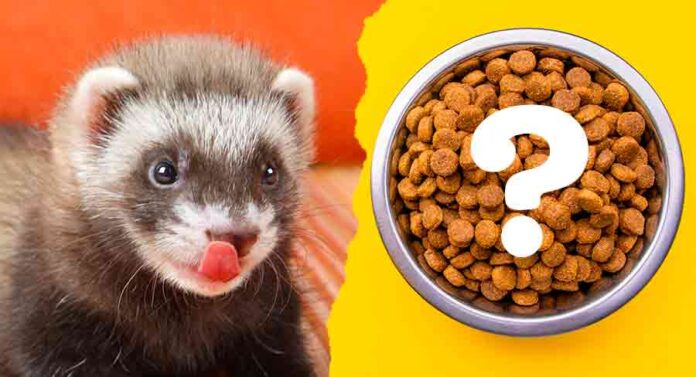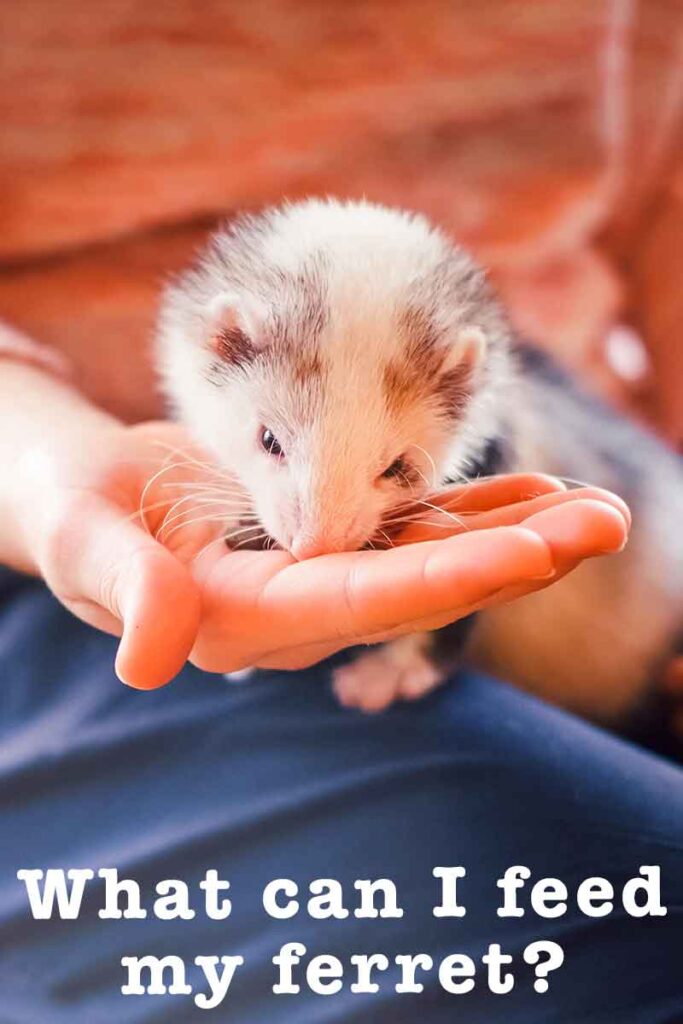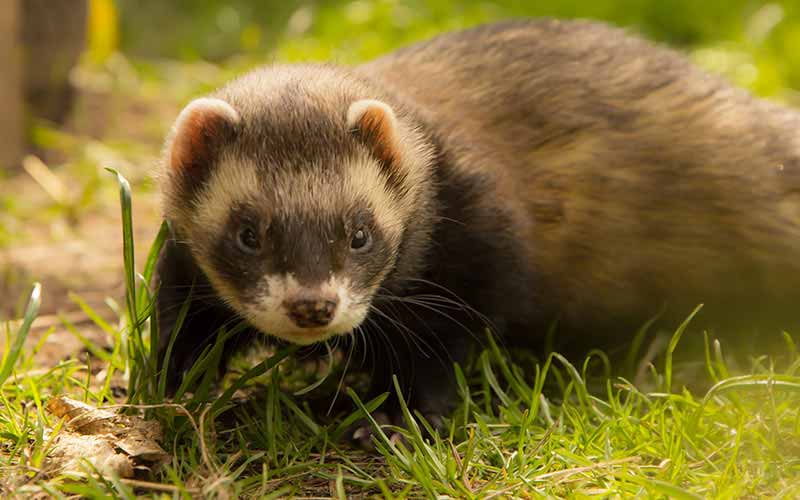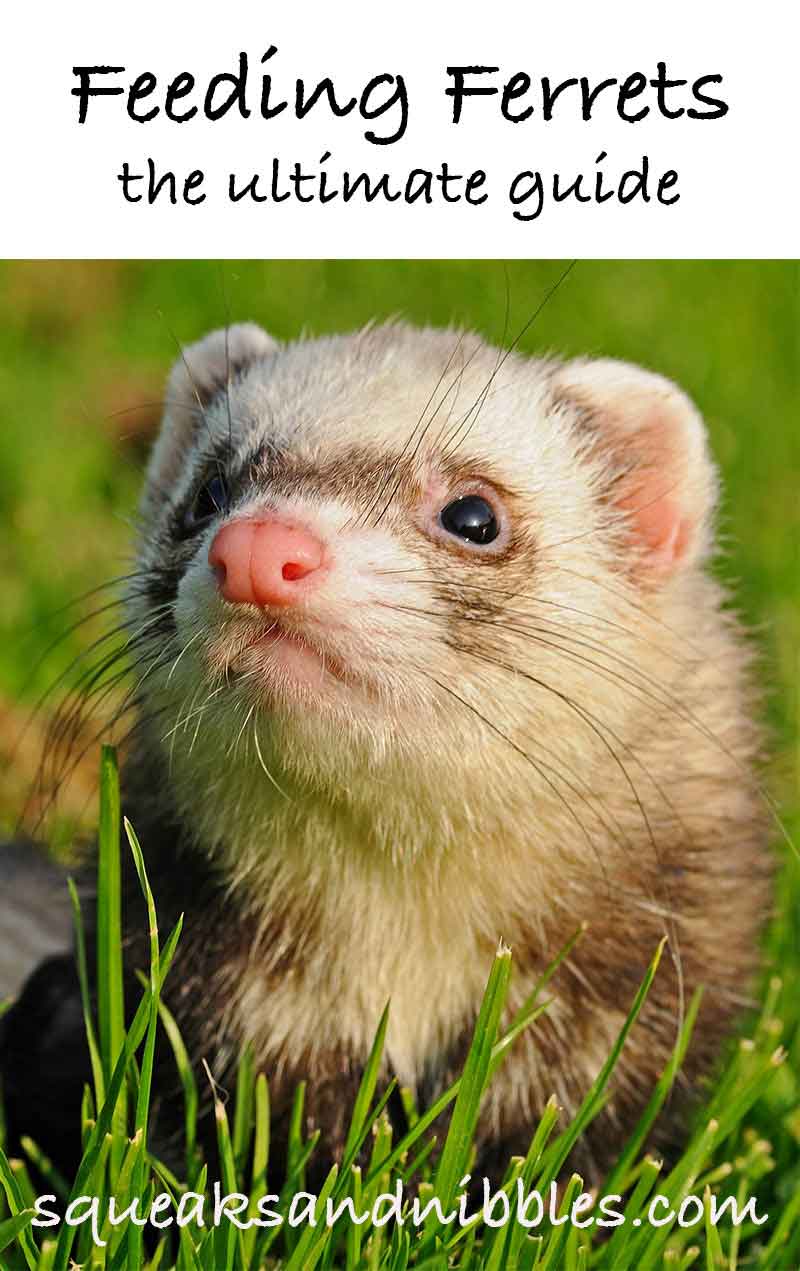How Often Do You Feed a Ferret

Learning what to feed ferrets is important for all ferret owners! Whether you choose a commercial kibble, a homemade diet, or the "whole prey" model, ferrets need plenty of meaty protein and fat. Avoid vegetable protein, as this can cause health problems!
In this guide, we'll take a closer look at exactly what nutrients your ferrets need, so you know the perfect answer to the question "what do you feed ferrets?". Let's dive straight in!
What Do Ferrets Eat?
What can I feed my ferret? We're glad you asked! Ferrets actually have a very different diet from other common rodent-like pets.
Domestic ferrets are obligate carnivores. This means they get all of the nutrients they need from animal products, including meat, bones, marrow, eggs, and more.
So, if you're wondering how to feed ferrets raw, you can either prepare them a meat-based homemade diet, or choose fresh or frozen "whole prey" that closely resemble what a ferret may eat in the wild.
Safe Foods for Ferrets Include:
- Rats
- Mice
- Chicks
- Raw eggs
- Cooked eggs
- Chicken wings
- Raw chicken livers
- Hearts
- Muscle meats
- Bone meal
- Cooked chicken
- Turkey necks
- Rabbit
- Minced beef
- Game birds
- Lamb
- Offal
- Raw animal bones

Ferret Diet – Nutritional Requirements
Answering the question "what do you feed ferrets" involves understanding their nutritional needs. As obligate carnivores, ferrets must have a meat-based diet. Ferrets need all of the following nutrients in their diet:
- Meat-based proteins
- Calcium
- Fats
- Phosphorus
- Vitamin E
- Amino acids
If you've chosen to use a commercial ferret food, ensure it contains at least 30% protein and close to 20% fat. Anything less won't meet your ferret's nutritional requirements. We will take a closer look at commercial kibbles in a moment.
How Often Should You Feed A Ferret?
The method in which you feed your ferret determines how often they should be fed. So, your ferret feeding schedule may be different to someone else's.
If you feed your ferret a pellet-based commercially prepared food, then you'll want to keep food in front of them at all times.
If you feed your ferret using the whole prey method, then they do not always need to have food in front of them. They will spend plenty of time eating and digesting their prey. Keeping excess prey around all the time can lead to spoiled meat, which can harm your ferret.

Should Ferrets Have Access to Food at all Times?
According to the VCA Animal Hospital, the digestive process in ferrets is quite quick. Plus, as a ferret ages, it may be more likely to develop pancreatic tumors that can cause excessive insulin production.
Both this quick motility and excessive insulin can cause low blood sugar when ferrets are not constantly digesting food. So, ferrets need plenty of food to "graze" on throughout the day.
But, there are times when you may need to limit their intake. If you notice your ferret gaining weight, then you may need to limit how much food they are eating. Instead, provide them with several tiny meals throughout the day.
Is Ferret Food Sold at Pet Stores?
There are many types of commercial ferret foods available. With so many options, it may feel overwhelming trying to select the right one.
Different brands of ferret kibble will differ in their nutritional content. So, as we said earlier, choose one that has at least 30% protein from a meat source, and close to 20% fat.
Cheap ferret food isn't a good option. These low-quality foods often contain too much filler (plant-based protein and ash) and not enough meat-based proteins.
Plus, if you are going to feed your ferret a kibble-based diet, then you might consider putting him on a hairball/obstruction preventative regime. Due to the lack of moisture in a dry diet, ferrets who eat primarily dry food are more likely to develop hairballs or other intestinal obstructions.

What Can Ferrets NOT Eat?
As we mentioned previously, ferrets get their energy from fat found in meat. Any non-meat protein they eat can cause indigestion, at minimum. In fact, excess vegetable protein can even cause bladder stones!
If in doubt, you should always consult with your veterinarian before giving your ferret food that you're not entirely certain he can have. Here are some foods that ferrets should avoid:
- Fruit
- Raisins
- Bread
- Cereal
- Crackers
- Grains
- Candy
- Beans
- Vegetables
- Salt
- Chocolate
- Any carbohydrate-rich food
What Should Ferrets Drink?
Regardless of your ferret's diet, be sure to provide them with plenty of fresh water! Tap water is fine, as long as it is clean and fresh.
If your ferret isn't drinking the water you're offering them, it is worth filtering it first. Perhaps it has a strong chlorine smell that is putting your ferret off!
Can I Feed My Ferret Cat Food?
According to the Banfield Pet Hospital, ferrets can be fed cat food, but only on a short-term basis. If you must feed cat food, it's recommended that you feed them a high-quality kitten chow that's preferably sold by a vet, as it is higher in protein and fat.
Feeding your ferret cat food alone, long term, will not provide the right nutritional balance for them.
Similarly, ferrets should not be given dog food. Many dog foods contain a lot of vegetable protein and fiber, which can really harm your ferret.
What Treats Can Ferrets Have?
So, what can I feed my ferret other than ferret foods? Here are some safe treats that you can give your pet ferrets.
- Commercial meat-based treats
- Raw or cooked eggs
- Meaty baby food
- Animal organs
- Muscle tissue
- Raw or cooked chicken
As with any pet, regardless of their species, be sure that treats make up only a very small percentage of their diet. Your ferret should always get the bulk of their calories from their main protein and fat source.
What Do Baby Ferrets Eat?
Along with fresh raw meat chunks and fresh water, baby ferrets under 12 weeks of age will also need goat's milk or another low lactose milk option, such as lamb's milk.
According to the British Ferret Club, ferret kits do best on four meals a day for the first two weeks. Following that, decrease meals to three times a day until ten weeks of age.
At 12 weeks old, ferret kits should be fed twice a day, and will only need milk twice a week. Of course, if you are ever unsure, the best person to speak to is your veterinarian.
What Do Ferrets Eat in the Wild?
The domestic ferret's distant weasel cousin is called the black-footed ferret. When left to their own devices, black-footed ferrets generally don't reach for plants, nuts, or vegetables.
Both black-footed ferrets and domestic ferrets are carnivorous animals that use fat for energy. So, they must eat a meaty and protein-packed diet for proper sustenance. They cannot tolerate a high-fiber or high-carbohydrate diet.
To meet their nutritional needs, black-footed ferrets primarily eat prairie dogs.
What to Feed Ferrets – Summary
If you're feeling uneasy about what to feed your ferret, your veterinarian will be able to help you. Just remember that they need plenty of meaty-proteins and fats. Steer clear or fruits, vegetables, and carbs!
What's your ferret's favorite food?
References and Resources
- Angel-Caraza, J. (et al), 'Mixed Urolith (Struvite and Calcium Oxalate) in a Ferret (Mustela Putorius Furo)', J Vet Diagn Invest (2008)
- Banfield Pet Hospital, 'Keeping Your Ferret Healthy'
- Black Footed Ferret Information
- Goose Creek Veterinary Clinic, 'How to Guide for Ferrets'
- Johnson-Delaney, C. 'Ferret Nutrition', Veterinary Clinics of North America Exotic Pet Practice (2014)
- Morrisey, J. 'Providing a Home for a Ferret', Merck Veterinary Manual
- The British Ferret Club
sullivanscondlefory.blogspot.com
Source: https://squeaksandnibbles.com/ferret-feeding/
Post a Comment for "How Often Do You Feed a Ferret"